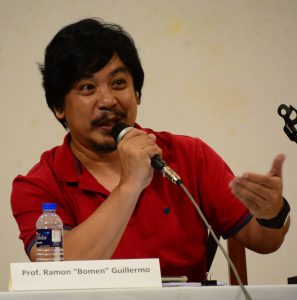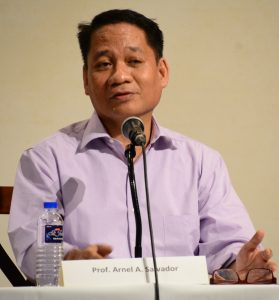
(NOV. 15) — On Feb. 12, hours before members of the UP Diliman (UPD) faculty began casting their votes for their choice of the next faculty regent, the campus held the 2018 Election of Faculty Regent Forum at the Malcolm Hall Theater.
Two of the three candidates for the position tackled questions from fellow UP faculty members, namely Ramon Guillermo, PhD of the College of Arts and Letters and Arnel Salvador, PhD of the College of Science. Victor Paz, PhD of the Archaeological Studies Program, declined to participate, according to UP Diliman (UPD) Chancellor Michael L. Tan.
The forum was the venue for candidates to present their plans and answer questions from the audience. Those who viewed the forum’s live stream were also able to field questions.
Most of the concerns raised were about faculty welfare and tenure.
Tenured appointment. Salvador said all policies should be stated, must be transparent and must be followed. He suggested all departments be required to state tenure rules. If collegiality is a condition for tenure, Salvador said gray areas must be quantified so no issues could be politicized.
Guillermo, on the other hand, called on the junior faculty to band together and share their experiences and be aware of the provisions in the Faculty Manual. In doing so, the junior faculty would know their rights thus preventing any abuse of policies.
Collegiality. Salvador said, “collegiality means we agree to disagree but at the end of the day we’re still agreeable. There are things that are academic in issues we will have differences in opinion but when we do our work we just back it up with facts. At the end of the day, you don’t agree with me but these are my findings. If there is somebody from a different school of thought and you like to get that guy out that is not a way for university progress. We are tested on ideas not on personalities. If it stands the test then we should be okay.”
Meanwhile, Guillermo said, “Fundamental sa ideya ng collegiality ang idea na tayo ay colleagues. Tayo ay magkakapantay sa unibersidad na ito. Ang mismong ideya ng collegiality ay nakapaloob na diyan ang usapin ng egalitarian na pagtingin natin sa isa’t isa bilang mga practitioner ng ating mga discipline, practitioners ng ating science. Ibig sabihin nito respect for each other. Mahalaga ang ideya na colleagues tayo. Kailangan natin pangalagaan ito sa ating interaksyon. Ito ang pinakamahalaga para maisulong natin ang ating gawaing intelektuwal sa ating pamantasan.”

Filipino and Panitikan. With news on the Supreme Court’s decision to uphold the Commission on Higher Education’s 2013 memorandum on the exclusion of Filipino and Panitikan (Philippine Literature) as core subjects in college, the two candidates were also asked their opinion on the issue.
Both agreed that Filipino and Panitikan are very important in college.
Salvador said it is very important for Filipinos to learn their language, “When I went abroad, I was asked ‘What makes you a Filipino? How are you different from the Thai, from the Indonesian? It all goes back to what is our heritage, what is our culture? I think it’s important to learn Filipino. People should learn our language. There are things that you cannot translate into English. There are emotions that will never be replicated by another language.”
Meanwhile, Guillermo said the issue hits very close to home. He urged the university to oppose the Supreme Court and say its decision is wrong. He believed that as an academic community, UP must be able to clearly communicate the knowledge learned in the university to the general public, and the way to do this is by communicating in Filipino.
“Dapat kaya nating magpaliwanag ng tuwid at maayos ng lahat ng ating pinag-uusapan dito, sa mas malawak na populasyon ng Pilipinas. Iyon ang ating tungkulin. Kung walang kasanayan ang ating mga estudyante, walang kasanayan ang mga guro natin, na magsalita ng tuwid, na magsulat man lang ng mga pagpapaliwanag ng kanilang pinag-aaralan sa wikang Filipino o iba pang wika ng Pilipinas, walang epekto ito sa mas maraming tao. Ang ating mga estudyante ay mawawalan ng kasanayan na ibahagi ang kaalaman ng ating mga matataas na institusyon ng pag-aaral sa nakararami.”
The selection of the new faculty regent began in October with Faculty Regent Patricia B. Arinto’s term ending on Dec. 31. The new faculty regent will serve in 2019 and 2020. The next faculty regent will be selected from the UPD faculty members.
Of 241 eligible UPD faculty members nominated to the post, five were top ranking. Of the five, two declined the nomination leaving professors Guillermo, Salvador and Paz to vie for the post.
UPD faculty members casted their votes on Nov. 12 at 4:01 p.m. via electronic voting. Manual voting began on Nov. 13 at 8 a.m. Electronic and manual voting ended at UPD on Nov. 14 at 4 p.m.
As per OVPAA Memorandum No. 2018-96, synchronized canvassing of votes “will be done at the same time across the UP System” after 4 p.m. today, Nov. 15.
